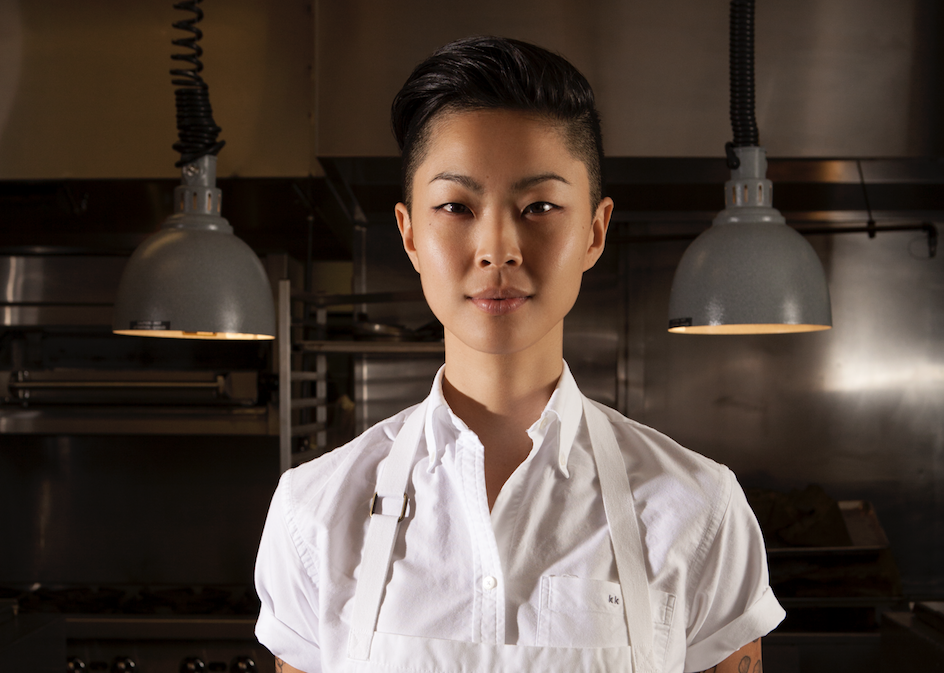Top Chef winner, devout culinary authority and warmhearted kitchen boss Kristen Kish is serving up the fruits of her labor, wining and dining Austinites at her new nostalgia-driven, technique-rooted restaurant, Arlo Grey.
By Courtney Runn, Kristen Kish photos by Rudy Arocha and Timothy Patrick Clancy , Arlo Grey interior photos by Chase Daniel, Burrata photo courtesy of Sydell Group

Kristen Kish is exactly who you hope she is in real life. She is kind, vulnerable, humble, thoughtful, passionate, completely and fully dedicated to her craft.
The 2013 Top Chef winner is the latest chef to join Austin’s burgeoning culinary scene with her new restaurant, Arlo Grey, which opened this summer to much fanfare and national attention. Adjacent to the lobby in the newly opened Line Austin hotel, Arlo Grey shimmers with Instagram-worthy opportunities. A minimalistic color palette of creams, blushes, blues and gold accents combined with greenery transform the space into a chic, trendy destination. Personal touches hint at the woman behind the kitchen doors. Pages from Kish’s personal notebooks and childhood photos subtly adorn the space, and quotes from The Korean Cinderella are scribbled graffiti-style on the bathroom walls.
Offering breakfast, lunch and dinner service, the dining room is often buzzing. If you study the kitchen doors long enough, you might catch Kish rushing from one end of the kitchen to the other or racing through the restaurant before her next big party arrives.
At 5 feet, 9 inches, with her signature cropped haircut, she is easily recognizable. Myriad delicate tattoos lace up her arms, but she is anything but delicate. Her slight frame belies her intensity and strength. She stands with the elegant confidence of someone who has fought to claim her own self-worth.
Kish is drawn to narrative. She hates best-of lists, preferring to judge food by the stories of its makers. She believes the best introduction to a city is through its people and their stories. A longing for storytelling peppers her reflections.
She has spent her life striving for perfection, running from vulnerability and searching for her worth. For so long, these battles dominated her story. She’s a Top Chef winner, television host, cookbook author and celebrated new restaurateur. Yet she doesn’t believe she’s arrived. Nor does she look to those accolades to bolster her identity. She is simply beginning a new chapter and facing her struggles.
When trying new food and meeting new people, Kish has a simple request: “Give me a story. Give me an understanding of who you are.” And that is exactly what she is offering Austin. Through her food, she is offering the city her heart on a plate. She is offering us her story.
A Dash of Celebrity-chef History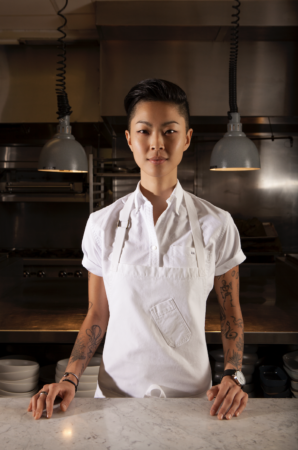
Kish is a celebrity chef. While she might not be a household name, she is a known name in the kitchen. Her actions reverberate throughout the culinary community, she has graced many a magazine cover and she has loyal social-media fans. Even though she won Top Chef almost six years ago, she has managed to do what many of her predecessors have not: stay relevant. With a stint as a TV host for the Travel Channel’s 36 Hours show and a cookbook under her belt, she has stayed in front of her fans while staying true to herself, a significant feat in a culture that idolizes celebrities and invites fans to have 24/7 access to them via social media.
The concept of the celebrity chef is still relatively new. While well-respected chefs have long existed, it wasn’t until the advent of reality television that a new type of celebrity was born.
“The idea that one could be famous…renowned, sure, but TV-celebrity famous? For cooking? It was preposterous,” Top Chef judge Tom Colicchio writes in the introduction to Top Chef: The Cookbook.
One of history’s first celebrated chefs was Bartolomeo Scappi. A Renaissance cook and the first recognized cookbook author, he served the papacy and was known for his inventive, lavish meals. His flair in the kitchen seems analogous to a 16th-century reality-TV cooking show, each challenge forcing players to become more extravagant.
The Paris Review writes of him, “It was never enough for Scappi to please diners. He set out to amuse, astonish and confuse them with vast menus of pungent flavors and retina-searing colors, presented in displays more akin to a performance-art piece than a dinner party.”
If Scappi was the first flashy celebrity chef, Alexis Soyer was the first activist celebrity chef. His memoir recounts how the popular Victorian chef brought his soup-kitchen model to Ireland during the Great Famine in 1847. He also worked with Florence Nightingale to reform military cooking during the Crimean War.
Julia Child, however, deserves the title of the first American celebrity chef in its modern iteration. Her success on television launched a new platform for chefs and sparked an insatiable hunger among the American public for consuming not only food, but also food media. She blazed a trail that led to the modern Food Network and Bravo stars.
“[Emeril Lagasse] is the most direct link between Julia’s television cookery in the 1960s and the ’70s and the 21st-century breed of celebrity-chef CEOs,” Alex Prud’homme writes in The French Chef in America. “While The French Chef was a documentary in nature, the Food Network focused on the drama and competition in kitchens, and turned cooking into entertainment and spectacle.”
The modern celebrity chef occupies a strange space. She fills a very niche celebrity world and is expected to have a voice and a presence. Thanks to social media and TV shows with few boundaries, fans feel like they actually know their favorite chefs.
“By being authorities on food, celebrity chefs have become authorities on life,” Signe Rousseau writes in Food Media. She continues later in the book, “Today, not only is the outlook for television cooks seriously lucrative, but ‘television cooking’ has also expanded semantically beyond the screen to include the stage, supermarkets, personal cellphones and computer screens.”
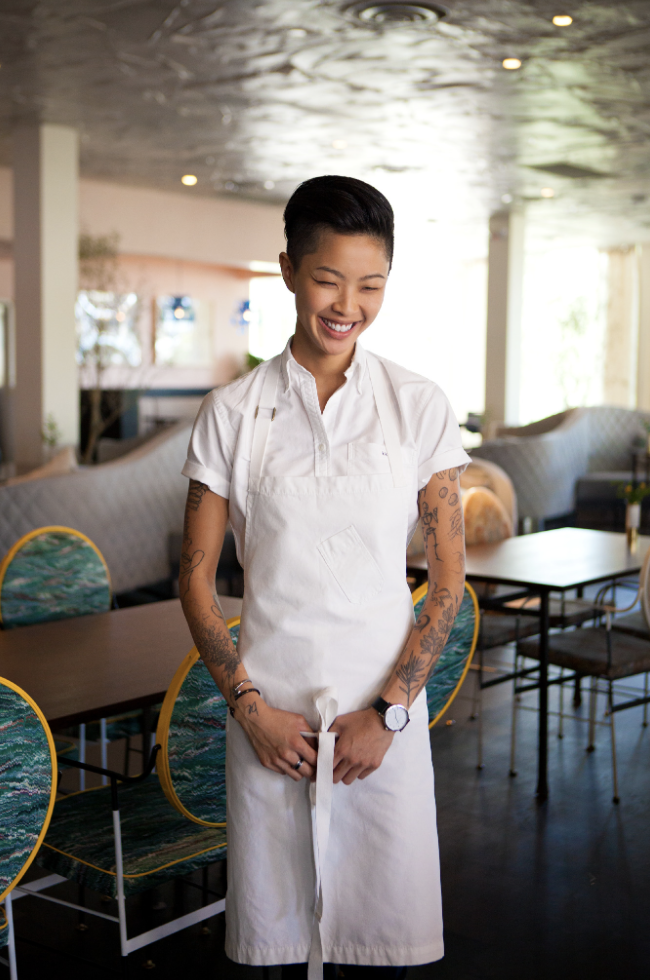 Kish unknowingly and begrudgingly entered this world in 2012 when Top Chef’s 10th season premiered. At first glance, she is not the stereotypical candidate for a reality-TV show: She is steady and even-keeled, not given to dramatic, emotional antics. While she can be funny and playful, she is very serious about her craft. Yet it was these qualities, combined with her intensity and passion for cooking with excellence, that drove her to success.
Kish unknowingly and begrudgingly entered this world in 2012 when Top Chef’s 10th season premiered. At first glance, she is not the stereotypical candidate for a reality-TV show: She is steady and even-keeled, not given to dramatic, emotional antics. While she can be funny and playful, she is very serious about her craft. Yet it was these qualities, combined with her intensity and passion for cooking with excellence, that drove her to success.
Kish has widely discussed how renowned chef and her mentor, Barbara Lynch, practically forced her on to the show. When Lynch previously served as a guest judge, she suggested Kish as a potential candidate for the upcoming season.
“Kristen was passionate about cooking and she knew the basics,” Lynch says. “I knew that she could win. And being on the show would let a much wider audience see how talented she is.”
Kish agreed to try out for the show, simply to make her mentor proud. She succeeded.
“I was so deeply proud of her to take that chance on Top Chef,” Lynch says. “And to win was even more incredible. She does not give up, and I love that she’s [stayed]true to whom she is: very humble and incredibly thoughtful.”
Not only did Kish take home the title of Top Chef, but she also accomplished a far more personal victory: the permission to finally be herself.
After a lifetime of closing herself off to others, it had just been nationally affirmed that people like her the way she is. And they really do. Anyone would be hard-pressed to find negative coverage of Kish.
While still selective with who she really lets in, she is incredibly open to sharing her story.
“As long as I’m open and vulnerable and honest, I can’t be mad at myself,” Kish says. “The majority of my life, I was so not vulnerable and it got me nowhere.”
Acquiring a Taste for Cooking
Kish’s story begins in Seoul, South Korea, in 1983. Her mother abandoned her after giving birth and Kish stayed in several orphanages until a couple from Michigan adopted her. Then she began a new life in the United States, at just a few months old.
In her cookbook, Kristen Kish Cooking: Recipes and Techniques, she opens with a detailed personal essay recounting her childhood and culinary path.
“As I grew up, I realized just how incredible it was to go from unwanted and abandoned by my birth mother to being part of a new, welcoming family, who felt only joy at my arrival,” she writes. “This is a bond we adoptees share.”
Kish says she never grows tired of hearing from fans who relate to her as fellow adoptees.
Her parents tried to keep her connected to her Korean culture by reading The Korean Cinderella with her and introducing her to Korean food.
From an early age, Kish loved playing chef and pretending to cook food, quickly taking her make-believe to the kitchen, writing she was “going through the process of cooking long before I had a concept of what went together or how to properly execute it.”
After Kish had a brief modeling career in high school and a stint in college studying international business, her parents suggested culinary school. She attended Le Cordon Bleu in Chicago and she came alive. She had found her calling and purpose. It would take several years, though, before she found the right fit in the culinary world.
After graduating, she turned to drugs and alcohol to suppress anxiety. At her mom’s urging, she saw a counselor but couldn’t bring herself to be honest, masking the struggles swirling within.
In an attempt at a fresh start, she chose Boston as her next home and found a job as a line cook. After a rough beginning, she chose to truly start from the bottom and learn from the best. She found a position under renowned French chef Guy Martin and slowly began to hone her skills and creative mind. When his restaurant came to an end, she followed her best friend, Stephanie Cmar, to Stir, one of Lynch’s restaurants. It was a serendipitous choice, and the rest is reality-television history.

Curating a New Culinary Family
After Top Chef, Kish led a largely nomadic lifestyle, hopping from project to project and traveling. Now she’s ready to make Austin her home. While she signed on late to Arlo Grey, moving to Austin in the spring before the summer opening, she is fully committed to her latest venture.
Kish begins her days at 6 a.m. and is in the kitchen until closing.
“I have no interest in being that chef that stands back and watches,” she says. “I’m in it with them.”
At the helm of her restaurant, Kish is not just creating a work culture, but also cultivating a family.
The food world has been fraught with tragedy this year as sexual-harassment and mental-health issues inundated the media. While the restaurant industry is known for its brutal hours, gritty culture and brash behavior, floodlights exposed its worst.
Kish is determined to forge a new culture in her kitchen.
“My goal is to shift what it looks like,” she says. “It’s not just come in and do your job and let me tell you all the 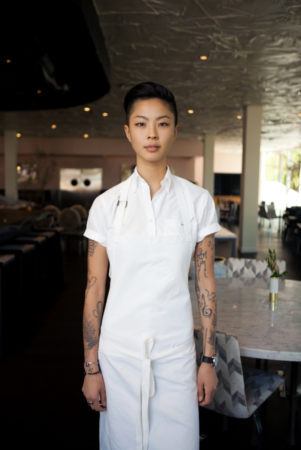 things that you did wrong and just think I’m the boss. On a human level, it’s about being a leader and being a manager and being someone who inspires and is tapping into somebody on a personal level. …”
things that you did wrong and just think I’m the boss. On a human level, it’s about being a leader and being a manager and being someone who inspires and is tapping into somebody on a personal level. …”
When she moved to Austin, she put out a call for staff. She considered everyone who applied and went with her gut. She opens the kitchen with her staff and closes with her staff. After service, they debrief the day together. Kish starts by admitting her own failures and flaws, and she often ends the day playing games with friends. Whether it’s Connect Four or Jenga, giving herself space to just play has been crucial to sustaining the exhausting pace of opening a new restaurant. They also have fun during service. Kish posted a video on Instagram of her staff prepping with an Aretha Franklin song playing in the background. Her staff is smiling, hugging, laughing.
Kish credits Lynch for modeling what a healthy kitchen can look like. Lynch is known for her mentorship of young chefs and has been instrumental in paving a way for chefs like Kish to not only have a place in the industry, but to be able to thrive.
“I want to make sure that young female chefs have a strong mentor so we can close the gender gap,” Lynch says. “Wouldn’t it be great if one day, we no longer have to qualify a chef with their gender? Chefs would just be chefs—period.”
Kish is ready to just be a chef. While she’s always happy to meet fans, the compliments that stay with her focus on her as a person and her food.
“Everyone has a story they maybe don’t always talk about,” she says. “My goal is to talk about it and to put it out there.”
From opening up about her mental health to being honest on social media, Kish doesn’t pretend to be an activist or official spokesperson for any issue, but simply strives to be genuinely and authentically herself.
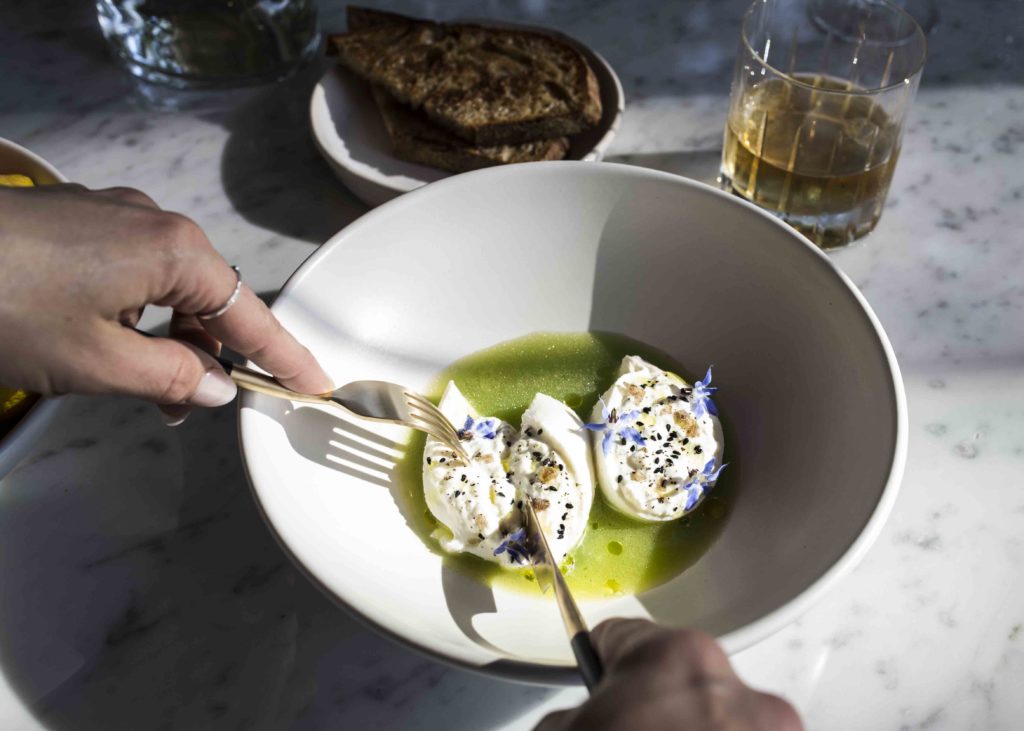 This shines through her food. While classically trained in French cooking, she endeavors to bridge the gap between fine dining and comfort food. Much of her Arlo Grey menu is based on childhood memories and includes elegant twists on her old favorites, like Hostess CupCakes and Hamburger Helper. Her menu achieves the perfect balance of adventure and comfort. Her burger swims in melted Gruyere, while her burrata delicately wades in cucumber broth. Regardless of palate or experience, Kish translates her memories and stories for every diner to understand.
This shines through her food. While classically trained in French cooking, she endeavors to bridge the gap between fine dining and comfort food. Much of her Arlo Grey menu is based on childhood memories and includes elegant twists on her old favorites, like Hostess CupCakes and Hamburger Helper. Her menu achieves the perfect balance of adventure and comfort. Her burger swims in melted Gruyere, while her burrata delicately wades in cucumber broth. Regardless of palate or experience, Kish translates her memories and stories for every diner to understand.
“If it ties somewhere familiar for me, it will do that for someone else. If I can connect with another diner through the medium of food, that’s all I want to do,” she says. “Food is supposed to make you feel really good and warm and full, both physically and emotionally.”
It is ironic—or at least telling—that Kish often forgets to eat. In the rush to prepare food for others, she’s too busy to feed herself, both physically and emotionally, and she’s quick to admit it.
“It feels weird to take time for me, to give back,” she says.
For the moments when she can’t give back to herself, her staff steps in. Before service, she often hears, “Chef, have you eaten?” If the answer is no, they whip up a sandwich for her. It’s those simple acts that mean the most to Kish and remind her of the importance of finding a family, not just employees, in the kitchen.
When Kish left Boston, she left her community. Her close friend, Kim Baccari, first became friendly with Kish when she’d stop in at Stir on her way home. Over shared late-night meals, the two quickly grew close, and Baccari became like an auntie to Kish.
“I was so bummed,” Baccari says of when she found out Kish was moving to Austin. “I’m going to have nobody else to raid my kitchen anymore.”
Like Lynch and many others have noted, Baccari confirms fame really didn’t change Kish. She’s shy and kind and humble and driven. And, Baccari laughs, she loves to sing through the carwash, just like anyone else. (But Baccari is also quick to point out that Kish thinks she can sing, though Baccari insists she really can’t.)
That down-to-earth persona is why when Kish hears the term “celebrity chef,” she recoils. She hates it.
Top Chef fans will be happy to know she’s still close friends with Gail Simmons, spends time with her former competitor Brooke Williamson and recently got a call from Padma Lakshmi, who was checking in on Kish’s restaurant. But Kish just sees them as her friends.
“We connect on a human level,” she says. “We don’t sit around and talk, ‘Hey, what TV show did you do?’ ”
Though the title “celebrity chef” is often tacked on to Kish’s name, at the end of the day, she is in a kitchen with her team, commiserating on mistakes and rejoicing about victories and playing games. No matter how many restaurants or books or TV shows are in her future, she will remain the same.
“When you do arrive, it’s over,” Kish says. “I don’t ever want to feel in that position ever in my life. I am a cook. I learn every day how to be a better leader. Being a cook is a bit more natural. At the core of who I am, I am a cook.”
